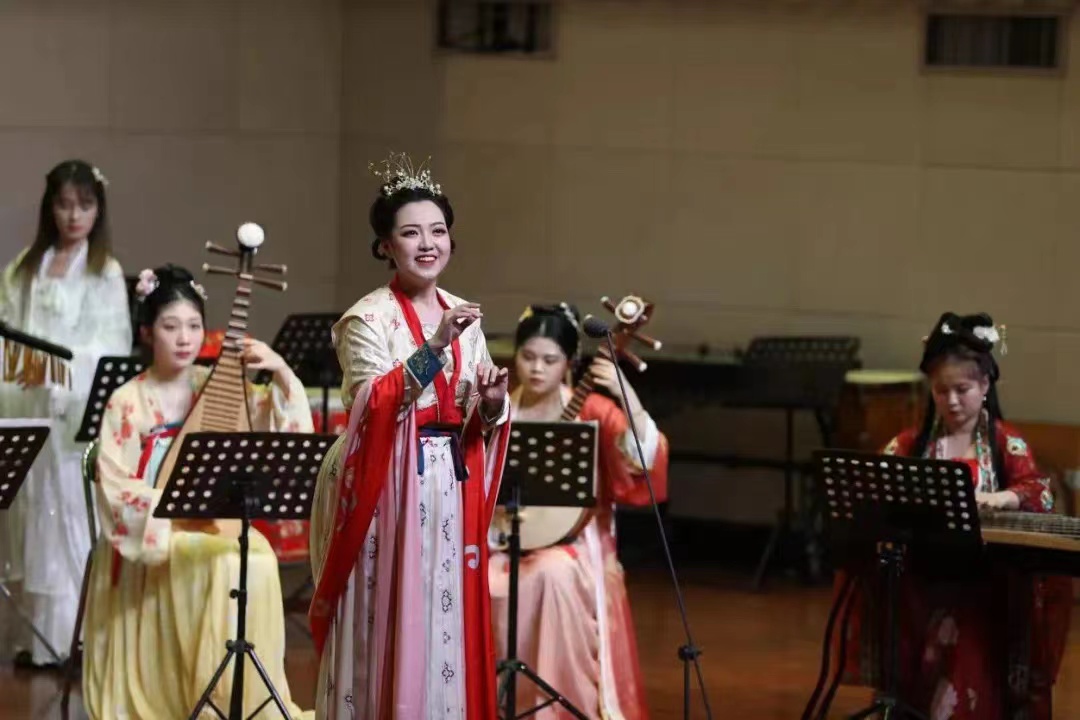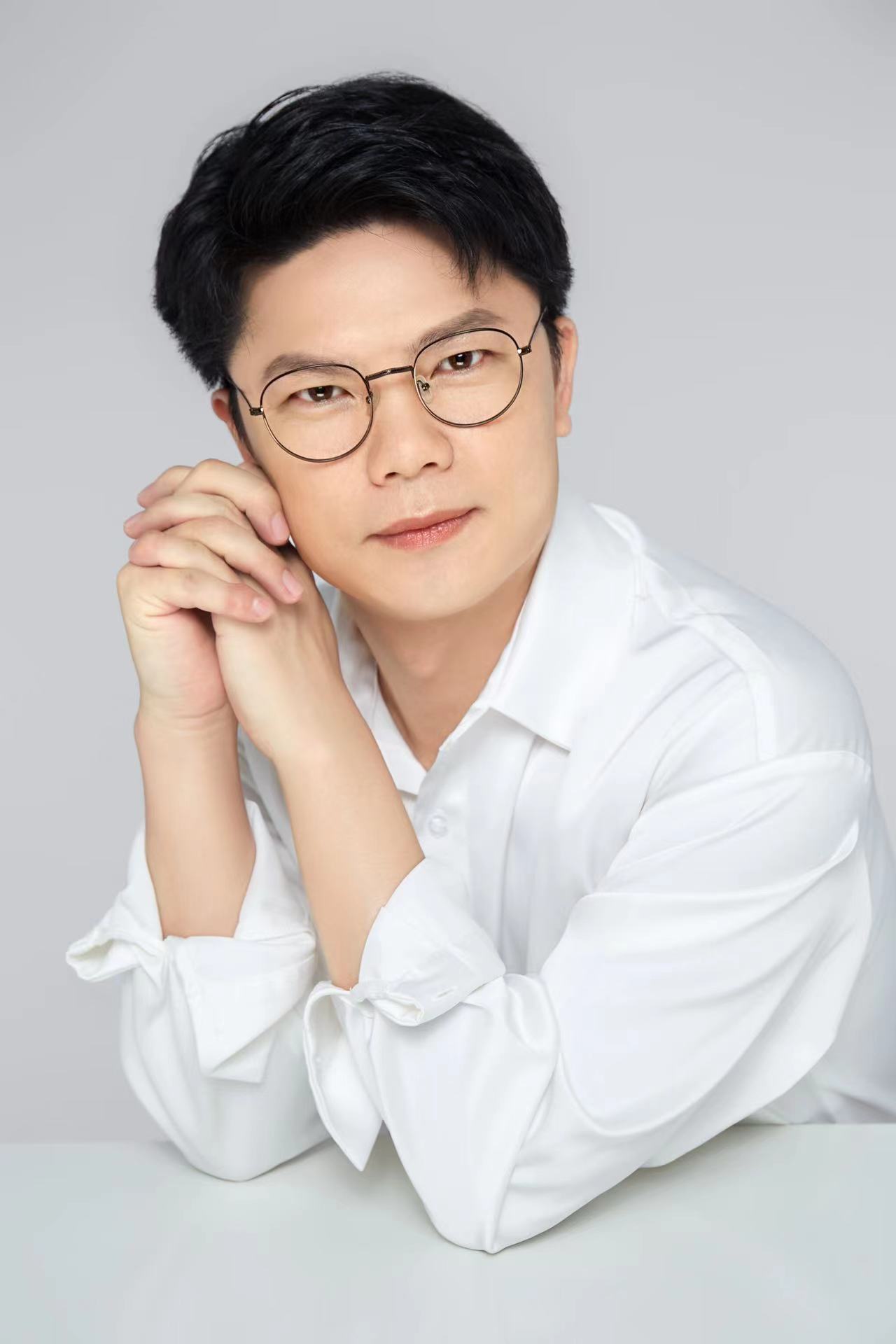Guangxi "ingredients" new approach, the traditional and contemporary music collided with a different "sound of Guangxi"



Qin Fengda's work "Song of the Yueren" was performed at the concert
Text | Ji Chen
On May 7, "The Earth Returns to Spring" - a special concert of folk music works by Qin Fengda was held in the Concert Hall of the South Lake Campus of Guangxi Arts Institute. That night, five new works received their premieres. Qin Fengda is a native of Guangxi and Zhuang, and is currently teaching at the Guangxi Arts Institute. He hopes that in his creation, he can take the history and culture of Guangxi and ethnic folk music as the cornerstone, and make the traditional and contemporary music collide with the contemporary expression to create a different "sound of Guangxi".
Guzheng works written in ancient and modern times

Dazzle - Infinite Motion", the first work premiered that night, is a re-upgrade of the guzheng quintet "Infinite Motion" composed by Qin Fengda last year. 2021, Zhejiang Conservatory of Music held the second workshop of five-color dazzling zheng music works, and invited guzheng works from all over the country.Finally, Qin Fengda's guzheng quintet "Infinite Motion" stood out as one of the six outstanding works and was shortlisted for the workshop. Through exploring the origin between Guangxi and Zhejiang, Qin Fengda learned that during the Ming Dynasty, Mrs. Wa of Guangxi Zhuang tribe was good at leading soldiers to fight against Japanese invaders along the coast of Zhejiang, and became a heroine of the Zhuang tribe for her bravery in killing the enemy.Therefore, in "Infinite Motion", he uses the image of "Wolf Cavalry" as the core rhythm of the piece, and at the same time, he uses two musical themes rich in the flavor of Guangxi folk music to represent Mrs. Washi and Wolf Cavalry, which interpenetrate the whole piece, and the development of the music is to depict the whole process of war.In the performance, the composer especially used the violin bow striking the guzheng strings to imitate the sound of swords and cold weapons clashing on the battlefield. After the premiere, Zhou Zhan, a professor of guzheng at Zhejiang Conservatory of Music, suggested that percussion could be added to the work for better effect.Qin Fengda then took the advice and revised the piece this year. Qin Fengda said, "At the beginning of this year, the recurrence of the epidemic made everyone's mood rather low, so I wrote the percussion very dazzling, hoping that it would serve as an inspiration and have the good wish to dispel the epidemic." He titled this version for percussion and guzheng quintet "Dazzling - Infinite Motion".
Tone Poem of the Sea" for guzheng and piano duet is a work commissioned by Fang Fei, a graduate student of Zhou Zhan, to Qin Fengda after the premiere of "Infinite Motion". The work begins with a sea wave drum, as if leading the audience to the sea of Beibu Gulf, with a glimpse of the moonlit beauty, and also expresses the aspiration of the people of Guangxi and the neighboring ASEAN countries for a better and happier life."Because it's a commissioned work, it will be a little more difficult to write in terms of performance." Before composing the piece, Qin Fengda had thought for a month about how to set the strings. "Different composers go about re-setting the strings according to their own needs when they compose guzheng works.I started from the most primitive pentatonic scale and incorporated the CNC thinking of modern composition, in which there is a collection of toneless and tonal." Qin Fengda also combines the technique of the dulcimer with the guzheng, where the performer needs to use the technique of the dulcimer, resulting in a unique sound effect.
Contemporary Expression of Guangxi Folk Folk Music
The "Song of the Yue People" is from the Western Han historian Liu Xiang's "The Book of Sayings - The Book of Good Sayings", which is more than 2,500 years old.
By reviewing a lot of information, Qin Fengda saw that Zhu Zhuxian, a professor of Chinese at Zhongnan University for Nationalities, mentioned in his article "Saying "Yueren Song" that the singing "Yueren" should be an ethnic minority girl who was good at singing poems and rowing and oars.According to the records of Luocheng County, Guangxi: Liu Sanjie, the prototype of Liu Sanmei, was born in 618 AD. The year 618 A.D. was the middle age of the Tang Dynasty, which is also 1400 years ago.According to Qin Fengda, "I believe that the melody Liu Sanmei sang back then was not her original creation either, but she combined local regional musical elements." Before Qin Fengda composed "The Song of the Yue People," many composers had composed "The Song of the Yue People".However, as a native of Guangxi, Qin Fengda's "Song of the Yue People" was written for soprano and ethnic chamber music, and he used the most original "Liu Sanjie" tones and rhythms as the material, and tried to "translate and compose", which made his "Song of the Yue People" quite a Guangxi flavor.In order to better present the sense of age, Qin Fengda specially bought voodoo drums. The voodoo drum is a Nigerian musical instrument shaped like a wine bottle, which is made of clay firing, and it has a very original sound.In ancient times, the Zhuang people were good at growing rice and used frogs as a totem to pray for good winds and rain. This is why the piece includes a wah-yin pipe (also called a wah-wah pipe) to simulate the sound of frogs calling in the rice fields. This work is also the most anticipated work of Qin Fengda himself in this concert, "It is most suitable for "Song of the Yue People" to be premiered in Guangxi."
The "Three Drunken Hibiscuses" was composed for fourteen players. The hibiscus emerges from the water, as beautiful as an Nymphaea. The music is clear and pure, but not lacking in tenderness, as if the beauty were drunk for the first time. Qin Fengda's delicate compositions show a rich variety of timbre and emotional expression.
The Arctic Circle was composed for nine performers, and Qin Fengda himself took the stage to conduct this work during the concert. It is also the only one of the five works in this concert that does not have elements of Guangxi. "The epidemic makes us reflect more on what negative effects human activities have brought to the earth. I hope that through this work, we can arouse the awareness of environmental protection." The work uses a Chinese and Western chamber music arrangement, with violin, viola, cello, double bass and piano added in addition to pipa, erhu and bang flute. The work brings great contrast, contrast by depicting a world from clean and flawless to crumbling, "At the end of the work, the music gradually quiets down, just as I hope humanity will return the silence to the Arctic." Unlike other works that incorporate elements of Guangxi or ethnic folk music, "Arctic Circle" is a contemporary work in which tuneless music is used extensively. Qin Fengda was still apprehensive about playing such a work in Guangxi. But after the performance, a retired teacher from Guangxi Arts Institute came to congratulate Qin Fengda and told him that the work he was most moved by was "Arctic Circle". "The audience is not necessarily unable to understand the tuneless music, and the composer is not necessarily writing what people can't understand. Everything is written for the work, for the theme, and the composer is just looking for, and determining, the most suitable way of expression." Fengda Qin said.
Bringing a new voice to Guangxi

Feng DaQin
Qin Fengda graduated from the Department of Composition of the China Conservatory of Music under the tutelage of composer and music theorist Gao Weijie. In August 2020, Qin Fengda, as a high-level introduced talent of Guangxi Arts Institute, started to work as a full-time teacher in the composition department of the Conservatory of Music, as well as the assistant artistic director of China-ASEAN Music Week and the founder and leader of China ASEAN Contemporary Orchestra, bringing more diversified musical elements back to Guangxi.
As the artistic director of this concert, composer Zhong Juncheng, professor of composition at the School of Music of Guangxi Arts College, gave Qin Fengda extremely high recognition. "From the composing point of view, it is very rare that the repertoire chosen for this concert is of high quality and each piece is highly recognized and appreciated by the audience and industry peers. From the composer's point of view, Qin Fengda tried to use different compositional techniques in each piece to create, such as numerical control, color sound and other techniques, all reflecting his ability to master traditional and modern music language. Thus the greatest feature of this concert is the fusion collision of tradition and modernity, which makes his music highlight modern technology in tradition, without losing the traditional flavor in modernity, while also creating a rich musical context and profound ideological connotation." Zhong Juncheng said that the artistic aesthetic height, professional technicality and audibility are highly unified in Qin Fengda's works, while not lacking in thoughtfulness and personal style. The whole concert, from duets to large national orchestra works are all original. Being able to create these works after work in just less than two years undoubtedly reflects his abundant personal talent of creative ability.
At the same time,Juncheng Zhong thinks that the concert is a historical breakthrough, "No one in Guangxi has ever held a purely professional folk music concert, and the subject matter and material are basically Guangxi elements. The works are all premieres, which is very rare and fully reflects the importance and training of the school leaders of Guangxi Arts Institute for young teachers. Compared with developed areas, Guangxi has to follow up on music creation, and needs young composers like Qin Fengda to create more, so that more people can hear the voice from Guangxi."
-THE END-

用户登录